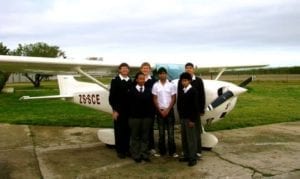South Africa’s first practical course to prepare high school students for a promising career future in the aerospace industry,Wings of Change, is being rolled out by the Cape Academy of Mathematics, Science and Technology (CAMST) High School.
Salomon Prinsloo (Sollie) from CAMST, who is heading up the Wings of Change programme says, “Considering the 45% growth in air traffic that South Africa has experienced since 2000, we see a golden opportunity for South Africa to develop a skilled workforce for an eager market, not only of pilots,but also of other industry specific occupations related to the extensive field of aviation.” The three year course is open for Grades 10-12, and is committed to bringing awareness of the aviation industry to students embarking on their career path. Cadets making their own wings Robin Coss Aviation has partnered with the Wings of Change programme and will involve students in the whole production and fabrication process of a modern training plane. Rob Cook, Robin Coss Aviation adds, “We are committed to the long term success of Wings of Change, and ensuring that the programme is ultimately self-sustainable. The RV 12 plane, which the students will build under supervision from Robin Coss Aviation, will be used to train CAMST students as pilots, and could also generate a future revenue stream for the programmethrough utilisation by other pilots in training.” Trusted wingman; Cape Town Flying Club The Wings of Change programme needed to partner with a flying school that shared the same passion with CAMST for developing South Africa’s aviation industry of the future, explains Sollie.Sollie states, “The Cape Town Flying Club fulfilled these requirements and then some.Recognised as one of the top flying schools in the Country with over 30 years of history.”
Government and NGOs flying in formation In 2013, Government’s Transport Education Training Authority (TETA) came on board as a funding partner, and has confirmed partial bursaries to support six CAMST students in the Wings of Change programme. Adds Sollie, “Training as a pilot or aircraft engineer is a very expensive exercise, and we are grateful for the financial support from TETA which has enabled us to offer the course to six students who show tremendous dedication, skills and aptitude, but who do not have the financial means to let their dreams take flight.” Need extra lift. We are greateful for the financial support from TETA, however there remains a high barrier of cost for training our students and additional funding is desperately required if we are to make a meaningful impact on the future job prospects of our eager youth. Support from the major role players in local Aviation,as well as interested corporates and individuals, is urgently needed to ensure the CAMST Wings of Change programme makes a valuable contribution to the growth of South Africa’s domestic technology, and creates marketable skills and meaningful job opportunities for today’s youth.”










